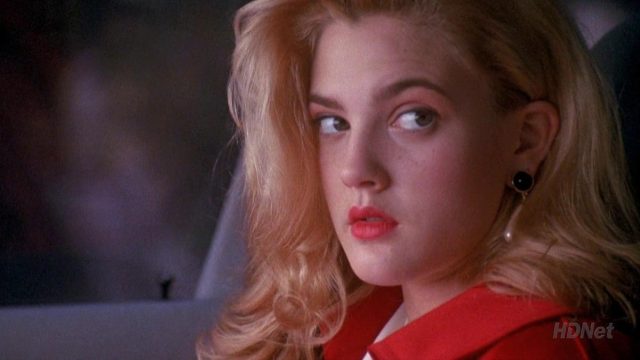Katt Shea’s sultry, over-the-top Poison Ivy, a 1992 erotic thriller, begins with teenage bad girl “Ivy” (Drew Barrymore) on a rope swing, looking heavy-lidded and enraptured. Is she lost to an inner dreaminess? The sheer physical sensation of swinging back and forth over the drop down to the water? Or does she just know that she makes an irresistibly compelling picture? Sylvie Cooper (Sara Gilbert), her annoyingly wise-ass chronicler, leans toward the latter; you would too, if you couldn’t stop looking.
To the sedate, wealthy suburb she intrudes on, Ivy–who gets her nickname from the ivy-festooned cross tattoo on her thigh–is “trashy,” which is to say she enjoys herself, her persona, and her body enough to invite attention. She’s out-of-place, a weed.
But so much of this apparent unruliness is a veneer. The scandalous tattoo is–at least at first–a stick-on. She can be courteous and compassionate, especially to Sylvie’s mom, the terminally ill Georgie (Cheryl Ladd). When she and Sylvie first officially meet, Sylvie’s in the principal’s office for having called in a fake bomb threat; Ivy’s just there because she’s a scholarship student whose grades have been slipping. There’s some complexity to the intense, turbulent, half-sisterly-and-half-erotic friendship the two develop–Ivy doesn’t just move into Sylvie’s house, she moves into her bed. They both want the same thing: to be loved the most, to be loved the best, to belong. Do you have the better claim on a life because you’re born to it? Maybe. Or, Ivy thinks, maybe not.
Then again, there’s some ambiguity as to just whose life Ivy wants. Sylvie’s? Or Georgie’s? The movie makes much of the physical resemblance between the vibrant Ivy and the dying Georgie, and Ivy even begins to wear Georgie’s clothes–first at Georgie’s own encouragement, later more independently and surreptitiously. Right from the start, Ivy feels the way Darryl (Tom Skerritt)–Sylvie’s dad, Georgie’s husband–looks at her, and, with the preternaturally at ease sexuality of any erotic thriller protagonist, she encourages him. But there’s no sense of a reciprocal attraction. She doesn’t want him, she wants … it’s hard to say. The stability she thinks would come from belonging to him? The sense of power? To be what he needs, the way she wants to be what everybody needs?
Of course, all the moody, hard-to-untangle emotional and motivational complexity of this movie comes second to the pure schlock factor, at least when you’re actually watching it. We’re barely into the movie when Ivy beats a dying dog to death with a pole! This is a classic case of oven cat, and Poison Ivy pays it off: by the time we’re halfway through, Darryl is performing cunnilingus on Ivy while she sits on a bed beside his unconscious, dying wife. The movie is camp, an erotic soap opera with deeply annoying teen voiceover. It’s easy to dismiss it as trash, just as other characters initially dismiss Ivy herself, and there are plenty of legitimate weaknesses here. (Barrymore isn’t one of them. She hasn’t done much in this mode, and that’s a shame, because she’s both messy and magnetic here.) But there’s also a raw power, and there are depths that are all the better for being left murky and incompletely explored.
Poison Ivy is streaming on the Criterion Channel.

